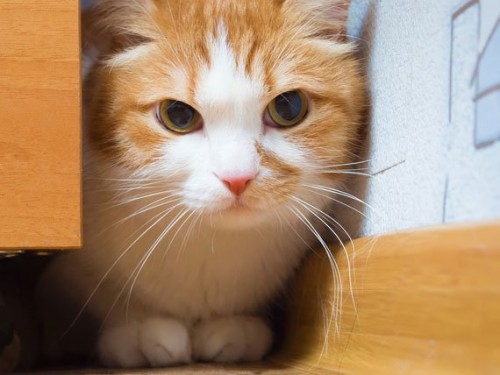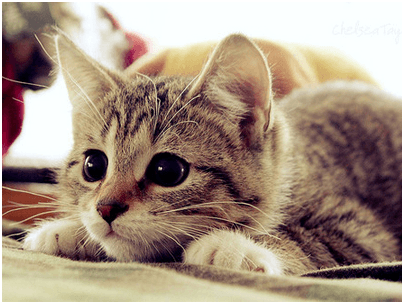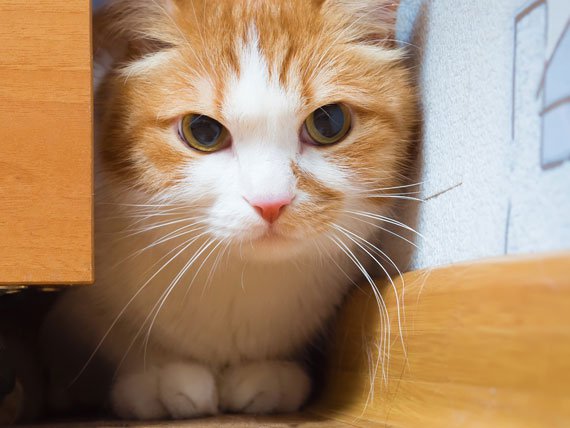How to Recognize Stress and Anxiety in Cats
Guest Writer: Craig Davis
The behavior of your cat can suddenly change due to stress or anxiety, which can be easily identified by its reaction to other pets or people. It may even start scratching, biting, or showing other similar symptoms of hostile or aggravated behavior. While such behavior could be triggered by a change of place, an illness, or infection, you’ll be better equipped to handle the situation if you know how to recognize stress and anxiety in cats by understanding certain basics about the usual causes of anxiety and stress-related issues. On the other hand, if you ignore these symptoms, they could eventually compound to create serious ill effects on your pet’s health.

10 Signs That Your Cat is Stressed
When your cat is feeling fear, whether due to the presence of a stranger, being in a strange place, or some unidentifiable reason, cortisol gets released in the system. This happens as a normal defensive mechanism to help him “escape” the situation. However, if the threatening situation repeats often, it can start to affect your cat’s immune system and cause medical problems, behavioral issues, misbehavior, and even depression in your pet.
Sometimes the symptoms of stress are obvious, while at other times, it isn’t…causing your pet to suffer in silence. If you see the following signs in your cat, they call for the attention of a good veterinarian.
Personality Change: Normally, it’s the kittens that keep climbing all over you and clinging to you or their mothers. At times, a kitten or grown cat may cry incessantly due to separation anxiety. This can also happen because you have shifted around your home, moved, or are the process of packing or unpacking your stuff and the house is in chaos.
Urinating Everywhere: There are various reasons for cat stress, and some may result in your pet refusing to use the litter box. A cat can be put off from using his litter box if you have neglected maintaining it well enough, or a stranger/visitor with another pet has been allowed into your cat’s territory. Another possibility is that your pet may be suffering from any number of genuine medical problems, from diabetes to kidney stones, which makes it stressed.
Stool Problem: If your cat is acting funny and you are not able to find any reason that may have caused the behavior, check the litter box. Your pet could be suffering from diarrhea or constipation. Noticing a color change in its stool can help you spot the problem and seek medical attention.
Hiding: If your cat is generally a noisy, active one and all of a sudden it becomes quiet and sits in one place, it’s a sign of your pet’s anxiety. Normally, such withdrawal symptoms occur when the pet is under stress.

Excessive Howling: You ought to be concerned if your normally quiet kitty starts howling or vocalizing incessantly. The predominant cause could be stress. Make sure to take it to a vet without delay.
Decreased Appetite: Cats do not tend to skip a meal when they are hungry. If you find that your cuddly pet has not been eating what you normally feed it, and shows no other obvious symptoms of stomach upset, cat stress could be the underlying reason.
Sleeping Too Much: If you’ve owned your cat long enough, you’ll be familiar with its sleeping cycle. If you suddenly find that your cat is sleeping too much, you ought to attend to it. Anxiety in cats tends to make them sleep for unusually long durations.
Increased Grooming: Over-grooming is normally caused due to chronic stress or a series of events causing stress. There are various reasons why cats groom themselves. Some of them include the release of endorphins, or to seek comfort or self-soothing. Hence, stressed cats tend to increase their grooming. If this isn’t attended to, it can develop into a neurotic activity.
Scratching Everywhere: Anxiety in cats also increases their irritation and scratching tendencies. If you find that your cat goes around scratching all the walls and furniture, it could be a sign of cat stress.
Change in Behavior: Aggressiveness is something that should not be ignored. If you find your cat biting people and other pets, you ought to take it to the vet without delay.
Source: PetMD
How to Recognize Stress and Anxiety in Cats
Guest Blogger Bio : Craig Davis
Craig is the founder of Vet Organics, where he shares additional pet-related articles on the company’s blog. Vet Organics markets and produces their flagship product, EcoEars, along with a growing array of premium products dedicated to the health and wellness of pets.
***
- 4 Tips for Maintaining Healthy Weight for Your Cat - December 20, 2019
- 8 Amazing Benefits of CBD for Dogs and Other Pets - December 12, 2019
- Kibble or Canned Pet Food? What Should Your Pet Be Eating? - December 9, 2019

